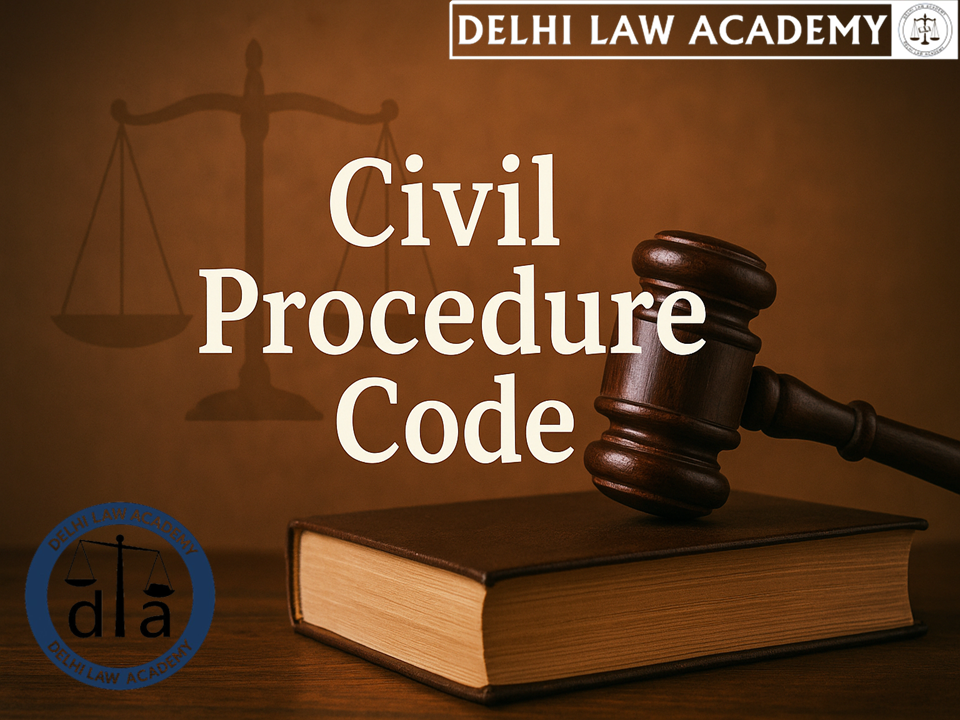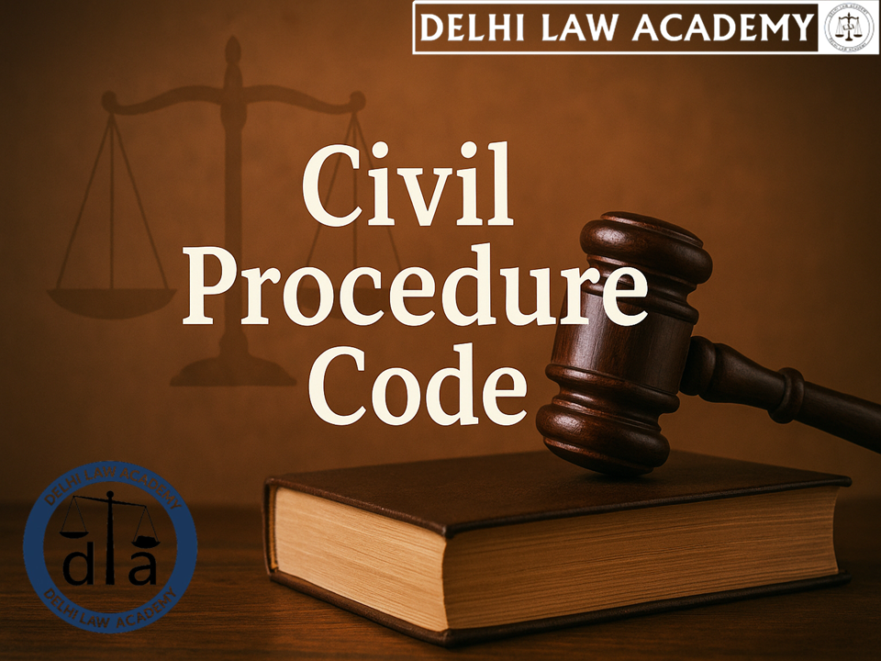
⚖️ Civil Procedure Code: Jurisdiction of Courts – Section 9 CPC Explained
COURTS TO TRY ALL CIVIL SUITS UNLESS BARRED
📘 Topics Covered
- Normal rule and burden of proof regarding jurisdiction of civil courts
- How can jurisdiction of Civil Courts be excluded?
- What is the Basis for determining jurisdiction?
- Whether jurisdiction can be conferred on a civil court by agreement?
- Where jurisdiction of civil courts is impliedly barred
- Where jurisdiction of civil courts is expressly barred
- Gundaji Satwaji Shinde v. Ramchandra Bhikaji Joshi [1979 SC]
🎯 Preparation for RJS, DJS, PCS (J) and Other Judicial Service Exams
CIVIL PROCEDURE CODE EXPLAINED
The Civil Procedure Code forms the bedrock of every Judicial Service exam in India. A thorough understanding of it is a must for aspirants of RJS, DJS, PCS (J) and other exams.
Delhi Law Academy Jaipur brings to you comprehensive study modules covering all essential aspects of CPC.
📜 Courts to Try All Civil Suits Unless Barred – Section 9 CPC
Section 9
- Courts shall have jurisdiction to try all suits of a civil nature, except suits whose cognizance is either expressly or impliedly barred.
Explanation:
- A suit in which right to property or to an office is contested is a suit of a civil nature even when such right depends entirely on questions of religious rites or ceremonies.
📖 Normal Rule and Burden of Proof Regarding Jurisdiction
- The court would normally lean in favour of a construction which upholds the retention of jurisdiction of civil courts.
- The burden of proof lies on the party who asserts that the civil court’s jurisdiction is ousted.
- Authority: Dwarka Prasad Aggarwal v. Ramesh Chandra Aggarwal [2003 SC]
💡 How Can Jurisdiction of Civil Courts Be Excluded?
- Exclusion of jurisdiction is not to be readily inferred; it must be explicitly expressed or clearly implied.
- Authority: Secretary of State v. Mask [1940 PC]
📅 Determining Jurisdiction – Date of Suit or Date of Hearing?
- If the court has jurisdiction when the suit comes for disposal, it cannot refuse jurisdiction merely because it had none at the date of institution.
- Authority: Sudhir Angur v. M Sanjeev [2006 SC]
⚖️ Basis for Determining Jurisdiction
- The question of jurisdiction is to be determined primarily on the averments made in the plaint.
- Authority: Ramesh Chand v. Anil Panjwani [2003 SC]
🤝 Can Jurisdiction Be Conferred by Agreement?
- Parties cannot confer jurisdiction where none exists under the Code. However, this does not apply when parties agree to submit to the jurisdiction of a foreign court.
- Authority: Modi Entertainment Network v. WSG Cricket [2003 SC]
🚫 Where Jurisdiction of Civil Courts Is Impliedly Barred
Example: Industrial Disputes
- The proper forum for resolving industrial disputes is under the Industrial Disputes Act, 1947. Hence, civil court jurisdiction is impliedly barred.
- Authority: C.T. Nikam v. Municipal Corporation of Ahmedabad [2002 SC]
⛔ Where Jurisdiction of Civil Courts Is Expressly Barred
Example 1: Rajasthan Land Revenue Act, 1956 – Section 259
- No suit or other proceeding shall lie or be instituted in any civil court with respect to any matter arising under this Act.
- However, if a question of title is involved in a boundary dispute or between estate-holders, a civil suit may be brought for adjudication of such question.
Example 2: Rajasthan Rent Control Act, 2001 – Section 18(1)
- Only the Rent Tribunal, and no civil court, shall have jurisdiction to hear and decide landlord-tenant disputes under this Act.
🏛️ Supreme Court on Section 9 – Landmark Case
Gundaji Satwaji Shinde v. Ramchandra Bhikaji Joshi [1979 SC]
Claim of the Plaintiff:
Plaintiff sought specific performance of a contract for sale of agricultural land (15 Dec 1965).
Defence of the Defendant:
Plaintiff was not an agriculturist as per the Bombay Tenancy Act; hence, the contract was void under Section 63.
Trial Court Findings:
The plaintiff was not an agriculturist, but since it was an incidental issue in a civil suit, the court held it had jurisdiction to decide it.
Relevant Tenancy Act Provisions:
- Section 63: Sale of land invalid in favour of non-agriculturists.
- Section 70(a): Mamlatdar empowered to decide if a person is an agriculturist.
- Section 85: Bars civil court jurisdiction for matters to be decided by the Mamlatdar.
Issue Before the Court:
Whether the civil court could decide if the plaintiff is an agriculturist or refer it under Section 85-A.
Supreme Court’s Observations:
- Mamlatdar is a forum to decide if a person is an agriculturist.
- Unless the Tenancy Act makes Mamlatdar the exclusive authority, civil court jurisdiction isn’t ousted.
- Sections 85 and 85-A oust jurisdiction only regarding questions under the Act, not the entire suit.
- Civil Courts cannot assume jurisdiction statutorily ousted by law.
- Therefore, if the plaintiff is not an agriculturist, the contract is unenforceable as it violates statutory provisions and public policy.
📚 Delhi Law Academy Jaipur – Simplifying Law for Judicial Aspirants ⚖️
📚 Continue Your CPC Preparation
Don’t stop here! Strengthen your knowledge of the Civil Procedure Code with our other fully solved tests:
📘 Free Study Material for Judiciary Aspirants!
Download our FREE study material prepared by Delhi Law Academy’s expert faculty.
💡 Frequently Asked Questions on Jurisdiction of Civil Courts (CPC Section 9)
Contact us
📍 Delhi Law Academy – Jaipur Branch
6C, Tower 2, Coaching Hub, Pratap Nagar, Jaipur – 302033
📞 Phone:
+91 9911916552
+91 8447285606
✉️ Email:
contactus@delhilawacademy.com

